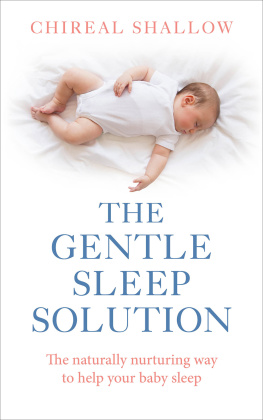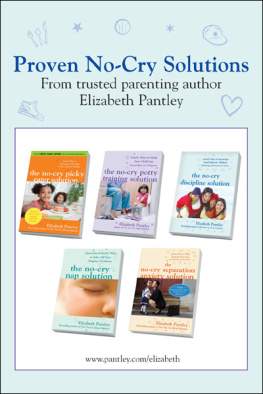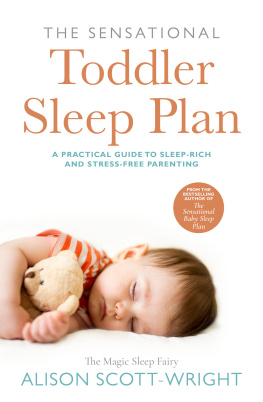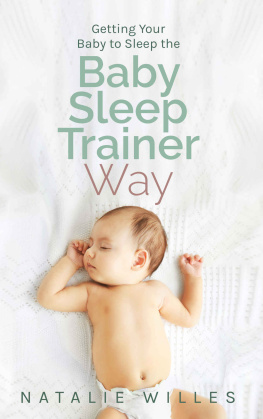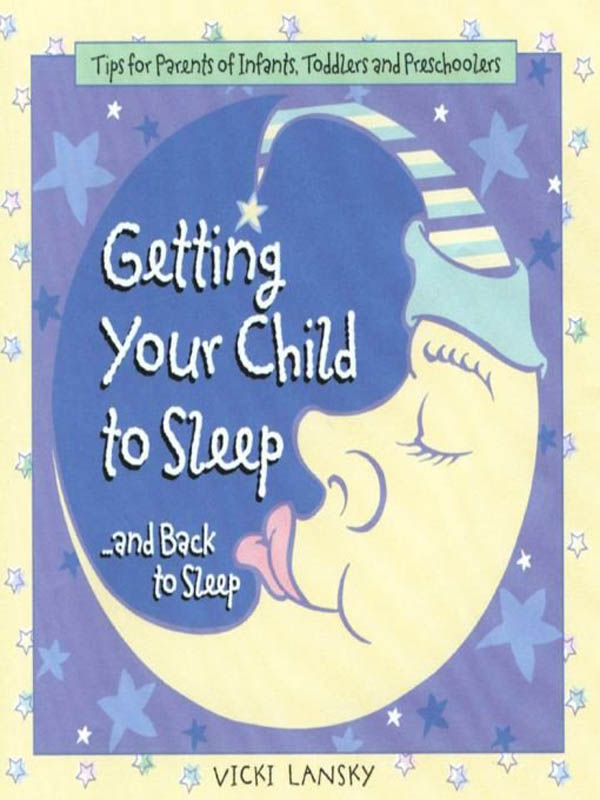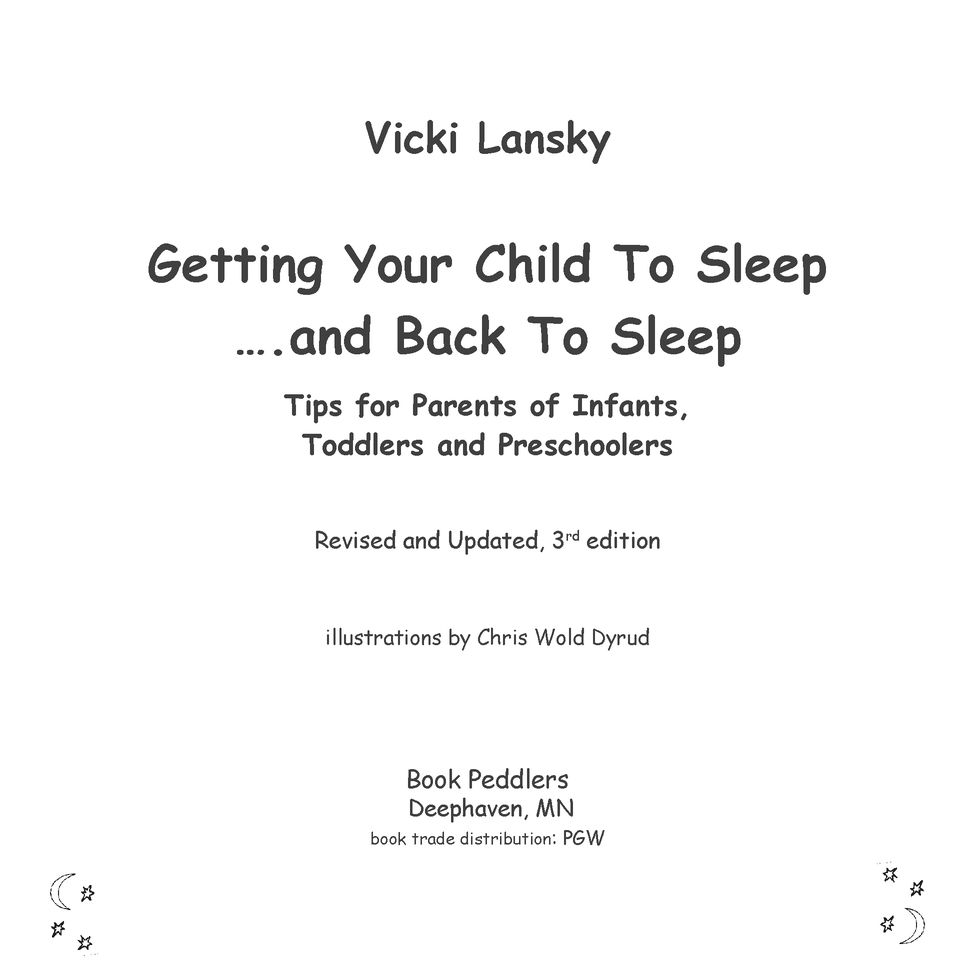Table of Contents
Thanks to-
Editors: Kathryn Ring, Sandra L. Whelan and Julie Surma, Judy Berry, Abby Rabinovitz and Dian Schwarze
Consultants:
Meg Zweiback, P.H.N., M.P.H.
Juanita Desmarais, Booth Maternity Center, Philadelphia, PA
Michael Thorpy, M.D., Montefiore Medical Center, Sleep-Wake
Disorders Center
Gail Farber, M.D.
Michael Meyerhoff, Ed.D.
Cover art and design: Pettit Network Designer:Alyn Shannon
Illustrator: Chris Wold Dyrud
Special thanks to the parents who shared their words and feelings. Their quotes are reprinted with permission from Vicki Lanskys Practical Parenting newsletter (1979-1988).
DEDICATION
To my son, Douglas Dylan Lansky, born May 31, 1970
who, despite giving me years of sleepless nights, grew up to be a wonderful, happy, handsome young man who, as a teenager, slept like a babyand often diduntil noon! Now with a family of his own, he again has sleepless nights to deal withand I dont!
introduction
When I was pregnant with my first child, the question I always asked of any young mother I met was, When did your baby start sleeping through the night? The answer was alwaysafter a few weeks, or after a few months. Not so bad, I thought. I could handle that.
It was only latermuch laterafter struggling to survive with my wonderful (albeit wakeful!) baby boy that I learned that lack of sleep was synonymous with motherhood and that, yes, I could survive a whole night without sleep and live to laugh about it.
Once I made peace with the fact that sleep as I had known it was no longer to be part of my life, I was somehow okay. I stopped being angry about being tired; after that I was only tired. Once I stopped expecting a night of uninterrupted sleep, it didnt bother me not to experience it. Life actually seemed easier.
As that baby grew, I found myself mentally documenting the reasons he woke at night. These included:
The need for food, attention, or a clean diaper.
The loss of a pacifier despite the fact that several were strewn about the crib.
Those landmarks of babyhood: teething, standing without the ability to sit down, separation anxiety.
The pain from a string in the foot of a sleeper wound around a toeonly discovered when dressing him to make a trip to the emergeny room.
Illnesses.
Nightmares.
Learning to find the toilet during the night.
And often, no reason I could figure out.
As my son grew and matured, wakefulness at night slowly diminished, but even then there were those nights. One night he called out to me, which was unusual because by then he usually came to my bed. I went to his room and found him stuck to his pillowcase because the gum he had in his mouth when he went to bed (unbeknownst to me) had fallen out of his mouth and had attached his face to his pillowcase. We changed pillowcases, bandaged his face to prevent him from resticking until we could deal with his skin in the morning, and I climbed back into my bed. That time I had trouble falling back to sleep from the silliness of it all.
But getting a child to sleep-and-back-to-sleep is not the impossible dream.
While there are no real guarantees, there are routines, products, tips, ideas, and approaches that can help you, and theyre all outlined here.This is the best of what has worked for parents and child caregivers. It worked for them, and it can work for you, too.
Vicki Lansky
Chapter 1
What Sleep Patterns Can I Expect from My Newborn for the First Six Month?
Sleep. A beautiful word, much on the minds of new parents because getting their infants to sleep is second only in importance to satisfying their needs for nourishment.
If this is your first child, the thrill of being a parent of a wonderful new human being will probably carry you through some sleepless nights, but when youre on duty 24 hours a day, 168 hours a week, the inevitable result is fatigue.
You may feel as if you are living through a month or more of wakefulness broken only by brief periods of sleep. That first month is definitely a long days night.
Try to relax. Grab sleep yourself whenever you can (which means when your baby does). Trust your own good judgment, and call on your doctor or pediatric nurse practitioner for advice if you think your baby has real problems.
And remember two things:
1. You cant spoil a newborn by picking him or her up for nourishment or comfort just as long as you thing its necessary.
2. You will look back on these early sleepless days and wonder at how quickly they passed. (Really you will.)
Infant Sleep Patterns
Your infants sleep pattern will be as unique as your child is. You cannot control your babys sleep cycles. Neither can you baby, for that matter. Sleep is not a skill to be learned. Dont let your mother or grandmother try to convince you otherwise! There is no right way for a baby to develop a sleep pattern.
During the first six months or so, sleep patterns are often the reflection of your babys individual biological development. Babies of this age cannot willfully resist sleeping when they are tired, nor can they continue to sleep when they are hungry.
Babies sleep patterns differ from those of adults in both quality and quantity of sleep.Your baby will have active sleep periods (with REMRapid Eye Movement), and quiet sleep, which is a much deeper sleep, without eye or body movement. During the periods of light or active sleep, a baby is easily awakened.
Approximately 50% of a newborns sleep is spent in each of these states, while an adult typically spends 80% of sleep time in quiet, deep sleep and will often wake up during these transitions. This is why your bay will often waken as you are tiptoeing out of the nursery. Rocking and nursing help a baby enter the deeper quiet sleep phase.
Babies sleep patterns also reflect their temperaments. Easy babies spend longer periods in deep, quiet sleep and often dont cry when they wake briefly during transition periods. More difficult or active babies carry their waking personalities into sleep, spending more time tin the REM periods and waking easily.As your baby matures the ability to pass through periods of light sleep will occur more quickly. However, each child reaches this point at his or her own pace.
A baby will get all the sleep needed, provided your baby is not in pain, left hungry, or constantly interrupted. If your baby sleeps very little there is not much you can do except adjust your attitude. Your baby will not suffer from the lack of sleep, but your may.There is also no relationship between health and how much sleep your baby gets. Healthy babies dont have to be good sleepers.
Try not to equate sleep with happiness (your or the babys) or superiority (yours or the babys). Whether or not your baby is a good sleeper, it is not a reflection of your parenting skills or of the babys goodness.
How Much Does a Newborn Sleep?
The following sleep patterns are averages only, and its important to remember that even the experts come up with different averages.
Newborns usually have about 8 sleep period a day of varying lengths often just in snatches. Some will sleep from feeding to feeding: others will not.


